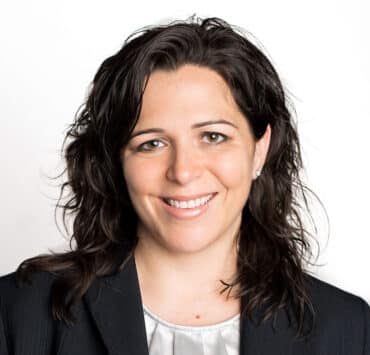|
Getting your Trinity Audio player ready...
|
Sarah Kalemeris has an impressive résumé: she earned undergraduate and master’s degrees in electrical engineering at Duke University and Vanderbilt University, respectively, then proceeded to study law at Northwestern University. She learned IP litigation and patent prosecution at Marshall, Gerstein & Borun LLP, and litigated high-tech cases before the International Trade Commission, district courts, and the Federal Circuit with Winston & Strawn LLP. In 2018, she came to T-Mobile prepared to do what it took to make sure a company she believed in was properly equipped and defended.
T-Mobile’s nationwide cellular network reaches 98 percent of the country and brings service to nearly 100 million customers. Research, development, and innovation have pushed annual revenues north of $30 billion, and a sound legal strategy is critical to protecting the intellectual property that has powered that impressive growth.
Months after Kalemeris stepped into her new role, Sprint Corporation and T-Mobile USA announced a $26 billion dollar merger to expand their network. The move also made T-Mobile an attractive target for individuals and companies who seek to assert allegedly essential patents to generate revenue.
“Whenever there is an assertion of patent infringement, we stand ready with a thoughtful and rigorous defense.”
Sarah Kalemeris
Not all of the patent claims adversaries raise are necessarily frivolous. While some cases are brought in bad faith or arise when inventors mistakenly believe they were the first to discover a novel technology, other sophisticated assertions involve real, complex patents and the nuanced use of arguably similar innovations. “Mobile carriers and internet providers have to be careful to protect patent portfolios and the intellectual property that is at the heart of the company,” Kalemeris explains. “Whenever there is an assertion of patent infringement, we stand ready with a rigorous and thoughtful defense.”
Although Kalemeris started at T-Mobile as an IP generalist and supported mainly patent prosecution, almost all of her current work is on the defensive litigation side. Adversaries range from individuals to large companies that specialize in acquiring patents they can use to sue large corporations. One company that has historically brought litigation against T-Mobile has purchased nearly one hundred thousand patents and sued dozens of companies to collect billions of dollars in fees.
Kalemeris’s background in electrical engineering helps her build relationships with internal employees she can call upon for information, support, assistance, and testimony. Her ability to “speak the language” also helped her find her niche in the law. Kalemeris was in her first year at Northwestern when she mentioned her undergraduate studies to attorneys at a social event on diversity and inclusion. When they encouraged her to look into patent law, Kalemeris found a natural fit. “I saw how I could merge two interests and find a way to be effective, and I stepped into that,” Kalemeris says. She joined Northwestern’s Intellectual Property Society and its Technology and Telecommunications group to pursue her emerging interest.
“There are so many intelligent people with diverse and innovative projects and initiatives here, and we can all learn from one another.”
Sarah Kalemeris
Although Kalemeris is busy defending T-Mobile against intellectual property assertions that arise, she also has the chance to counsel business leaders and ensure IP provisions of contracts are sound. Staying close to the business helps keep her fulfilled as she acquires and develops new skills. “I enjoy the in-house role because I get to collaborate with brilliant inventors and great businesspeople,” she says. “There are a lot of intelligent people doing different things here and we can all learn from one another.”
In recent years, T-Mobile has been emphasizing diversity, equity, and inclusion and working to build an inclusive and equitable corporate culture. Kalemeris and others in the legal department are similarly advancing the issues and have asked outside partners to meet specific DEI benchmarks. “T-Mobile’s customers are diverse and unique, and we want not only our employees but also our legal counsel to represent our customers, both in our makeup and our interests.”
After a lengthy review and approval process, T-Mobile’s merger with Sprint was finalized on April 1, 2020. Kalemeris has been helping the legal department integrate, and says she’s witnessed some surprising benefits of navigating the COVID-19 era. “We may have felt more separated since we were coming together as a newly formed entity, but remote work put everyone on the same playing field and helped us feel like part of the same team. We really are one company, and we got to feel that in a unique way,” she explains.
Still, T-Mobile prioritized employee safety, arranged all necessary protocols, and started bringing employees back to the office in late 2021 to maximize collaboration as the company expands its enhanced 5G network to new cities. The ultrafast 5G network now reaches about 300 million people, and T-Mobile recently brought 5G home internet to fifty-four southern cities and towns in Alabama, Louisiana, Mississippi, and Tennessee.
The broadband and cellular deployment and an increased use of the 5G capabilities will bring new opportunities to customers who rely on service for at-home work and education. Industry insiders say 36.2 million Americans (22 percent) will work remotely by 2025. The expanded network also represents new opportunities for patent holders interested in bringing claims against clients like T-Mobile. “We know we’re about to see a whole new wave of patent assertions from people who think they’ve invented parts of the 5G system,” she says. Those people may come after T-Mobile, but if they do, Kalemeris is prepared.
Gibson, Dunn & Crutcher LLP:
“Sarah is a top-notch lawyer who brings creativity and commercial savvy to resolving complex disputes. Sarah’s contributions are critical to a successful case strategy, and we are thrilled to see her recognized for her success.”
-Kate Dominguez, Partner

